|
A* Pathfinding Project
3.8.2
The A* Pathfinding Project for Unity 3D
|
|
A* Pathfinding Project
3.8.2
The A* Pathfinding Project for Unity 3D
|
Helper class for easily updating graphs. More...
Helper class for easily updating graphs.
The GraphUpdateScene component is really easy to use. Create a new empty GameObject and add the component to it, it can be found in Components–>Pathfinding–>GraphUpdateScene.
When you have added the component, you should see something like the image below.
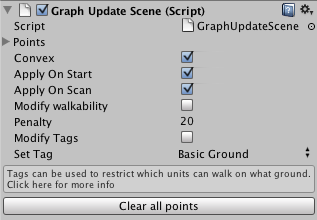
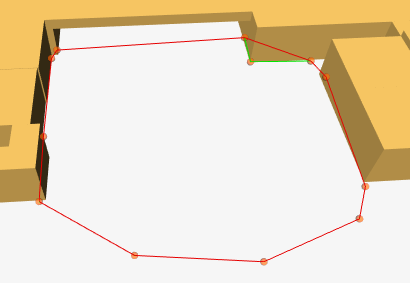
The above code will make it apply it's changes to the graph (assuming a GraphUpdateScene component is attached to the same GameObject).
Next there is "Modify Walkability" and "Set Walkability" (which appears when "Modify Walkability" is toggled). If Modify Walkability is set, then all nodes inside the area will either be set to walkable or unwalkable depending on the value of the "Set Walkability" variable.
Penalty can also be applied to the nodes. A higher penalty (aka weight) makes the nodes harder to traverse so it will try to avoid those areas.
The tagging variables can be read more about on this page: Working with tags.
Public Member Functions | |
| void | Apply (AstarPath active) |
| Apply the update. | |
| void | Apply () |
| Updates graphs with a created GUO. | |
| Bounds | GetBounds () |
| Calculates the bounds for this component. | |
| virtual void | InvertSettings () |
| Inverts all invertable settings for this GUS. | |
| void | LockToY () |
| Lock all points to a specific Y value. | |
| void | OnDrawGizmos () |
| Draws some gizmos. | |
| void | OnDrawGizmos (bool selected) |
| Draws some gizmos. | |
| void | OnDrawGizmosSelected () |
| Draws some gizmos. | |
| override void | OnPostScan () |
| Called right after all graphs have been scanned. | |
| void | RecalcConvex () |
| Recalculate convex points. | |
| void | Start () |
| Do some stuff at start. | |
| void | ToggleUseWorldSpace () |
| Switches between using world space and using local space. | |
 Public Member Functions inherited from GraphModifier Public Member Functions inherited from GraphModifier | |
| virtual void | OnGraphsPostUpdate () |
| Called after graphs have been updated using GraphUpdateObjects. | |
| virtual void | OnGraphsPreUpdate () |
| Called before graphs are updated using GraphUpdateObjects. | |
| virtual void | OnLatePostScan () |
| Called at the end of the scanning procedure. | |
| virtual void | OnPostCacheLoad () |
| Called after cached graphs have been loaded. | |
| virtual void | OnPreScan () |
| Called right before graphs are going to be scanned. | |
Public Attributes | |
| bool | applyOnScan = true |
| Apply this graph update object whenever a graph is rescanned. | |
| bool | applyOnStart = true |
| Apply this graph update object on start. | |
| bool | convex = true |
| Use the convex hull (XZ space) of the points. | |
| bool | lockToY |
| Lock all points to Y = lockToYValue. | |
| float | lockToYValue |
| if lockToY is enabled lock all points to this value | |
| float | minBoundsHeight = 1 |
| Minumum height of the bounds of the resulting Graph Update Object. | |
| bool | modifyTag |
| If enabled, set all nodes' tags to setTag. | |
| bool | modifyWalkability |
| Set to true to set all targeted nodese walkability to setWalkability. | |
| int | penaltyDelta |
| Penalty to add to nodes. | |
| Vector3[] | points |
| Points which define the region to update. | |
| bool | resetPenaltyOnPhysics = true |
| When updatePhysics is true, GridGraphs will normally reset penalties, with this option you can override it. | |
| int | setTag |
| If modifyTag is enabled, set all nodes' tags to this value. | |
| bool | setWalkability |
| See modifyWalkability. | |
| bool | updateErosion = true |
| Update Erosion for GridGraphs. | |
| bool | updatePhysics |
| Update node's walkability and connectivity using physics functions. | |
| bool | useWorldSpace |
| Use world space for coordinates. | |
Private Attributes | |
| Vector3[] | convexPoints |
| Private cached convex hull of the points. | |
| bool | firstApplied |
| Has apply been called yet. | |
| int | setTagInvert |
| Private cached inversion of setTag. | |
Additional Inherited Members | |
 Public Types inherited from GraphModifier Public Types inherited from GraphModifier | |
| enum | EventType { PostScan = 1 << 0, PreScan = 1 << 1, LatePostScan = 1 << 2, PreUpdate = 1 << 3, PostUpdate = 1 << 4, PostCacheLoad = 1 << 5 } |
| GraphModifier event type. More... | |
 Static Public Member Functions inherited from GraphModifier Static Public Member Functions inherited from GraphModifier | |
| static void | FindAllModifiers () |
| static void | TriggerEvent (GraphModifier.EventType type) |
| Triggers an event for all active graph modifiers. | |
 Protected Member Functions inherited from GraphModifier Protected Member Functions inherited from GraphModifier | |
| virtual void | OnDisable () |
| Removes this modifier from list of active modifiers. | |
| virtual void | OnEnable () |
| Adds this modifier to list of active modifiers. | |
| void Apply | ( | AstarPath | active | ) |
Apply the update.
Will only do anything if applyOnScan is enabled
| void Apply | ( | ) |
Updates graphs with a created GUO.
Creates a Pathfinding.GraphUpdateObject with a Pathfinding.GraphUpdateShape representing the polygon of this object and update all graphs using AstarPath.UpdateGraphs. This will not update graphs directly. See AstarPath.UpdateGraph for more info.
| Bounds GetBounds | ( | ) |
Calculates the bounds for this component.
This is a relatively expensive operation, it needs to go through all points and sometimes do matrix multiplications.
|
virtual |
Inverts all invertable settings for this GUS.
Namely: penalty delta, walkability, tags.
Penalty delta will be changed to negative penalty delta.
setWalkability will be inverted.
setTag will be stored in a private variable, and the new value will be 0. When calling this function again, the saved value will be the new value.
Calling this function an even number of times without changing any settings in between will be identical to no change in settings.
| void LockToY | ( | ) |
Lock all points to a specific Y value.
| void OnDrawGizmos | ( | ) |
Draws some gizmos.
| void OnDrawGizmos | ( | bool | selected | ) |
Draws some gizmos.
| void OnDrawGizmosSelected | ( | ) |
Draws some gizmos.
|
virtual |
Called right after all graphs have been scanned.
FloodFill and other post processing has not been done.
Reimplemented from GraphModifier.
| void RecalcConvex | ( | ) |
Recalculate convex points.
Will not do anything if not convex is enabled
| void Start | ( | ) |
Do some stuff at start.
| void ToggleUseWorldSpace | ( | ) |
Switches between using world space and using local space.
Changes point coordinates to stay the same in world space after the change.
| bool applyOnScan = true |
Apply this graph update object whenever a graph is rescanned.
| bool applyOnStart = true |
Apply this graph update object on start.
| bool convex = true |
Use the convex hull (XZ space) of the points.
|
private |
Private cached convex hull of the points.
|
private |
Has apply been called yet.
Used to prevent applying twice when both applyOnScan and applyOnStart are enabled
| bool lockToY |
Lock all points to Y = lockToYValue.
| float lockToYValue |
if lockToY is enabled lock all points to this value
| float minBoundsHeight = 1 |
Minumum height of the bounds of the resulting Graph Update Object.
Useful when all points are laid out on a plane but you still need a bounds with a height greater than zero since a zero height graph update object would usually result in no nodes being updated.
| bool modifyTag |
If enabled, set all nodes' tags to setTag.
| bool modifyWalkability |
Set to true to set all targeted nodese walkability to setWalkability.
| int penaltyDelta |
Penalty to add to nodes.
Be careful when setting negative values since if a node get's a negative penalty it will underflow and instead get really large. In most cases a warning will be logged if that happens.
| Vector3 [] points |
Points which define the region to update.
| bool resetPenaltyOnPhysics = true |
When updatePhysics is true, GridGraphs will normally reset penalties, with this option you can override it.
Good to use when you want to keep old penalties even when you update the graph.The images below shows two overlapping graph update objects, the right one happened to be applied before the left one. They both have updatePhysics = true and are set to increase the penalty of the nodes by some amount.The first image shows the result when resetPenaltyOnPhysics is false. Both penalties are added correctly.
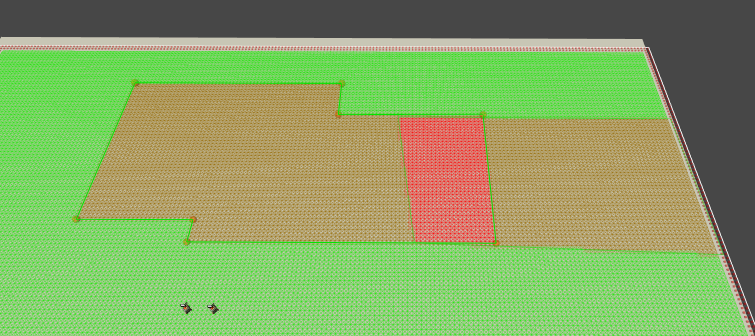
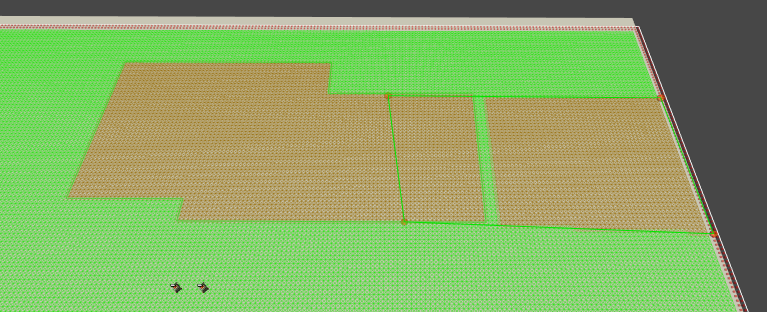
| int setTag |
If modifyTag is enabled, set all nodes' tags to this value.
|
private |
Private cached inversion of setTag.
Used for InvertSettings()
| bool setWalkability |
See modifyWalkability.
| bool updateErosion = true |
Update Erosion for GridGraphs.
When enabled, erosion will be recalculated for grid graphs after the GUO has been applied.In the below image you can see the different effects you can get with the different values.
The first image shows the graph when no GUO has been applied. The blue box is not identified as an obstacle by the graph, the reason there are unwalkable nodes around it is because there is a height difference (nodes are placed on top of the box) so erosion will be applied (an erosion value of 2 is used in this graph). The orange box is identified as an obstacle, so the area of unwalkable nodes around it is a bit larger since both erosion and collision has made nodes unwalkable.
The GUO used simply sets walkability to true, i.e making all nodes walkable.
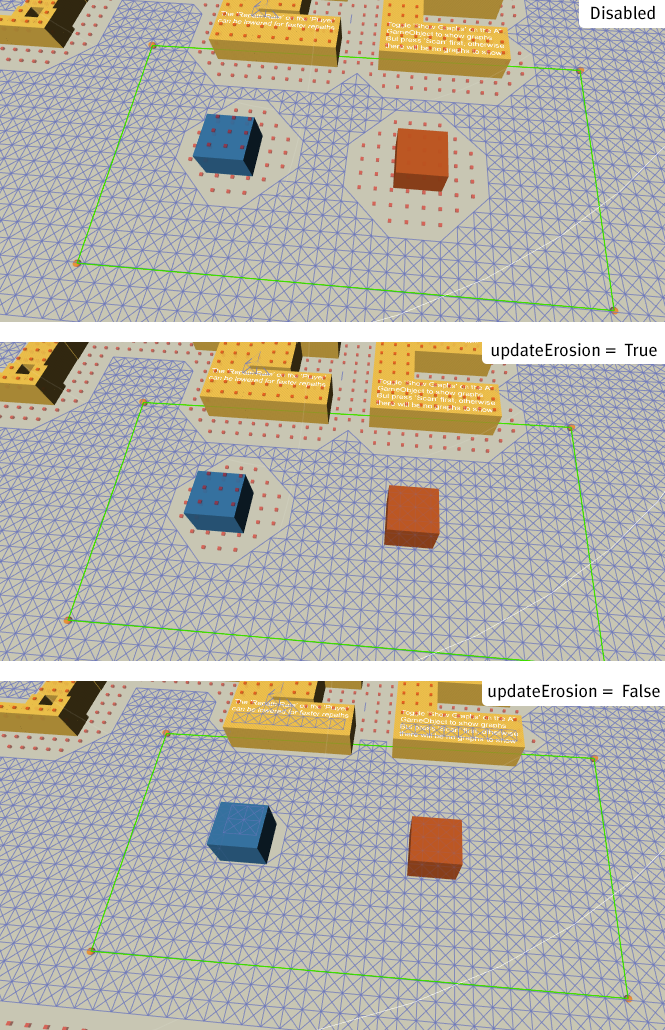
| bool updatePhysics |
Update node's walkability and connectivity using physics functions.
For grid graphs, this will update the node's position and walkability exactly like when doing a scan of the graph. If enabled for grid graphs, modifyWalkability will be ignored.
For Point Graphs, this will recalculate all connections which passes through the bounds of the resulting Graph Update Object using raycasts (if enabled).
| bool useWorldSpace |
Use world space for coordinates.
If true, the shape will not follow when moving around the transform.